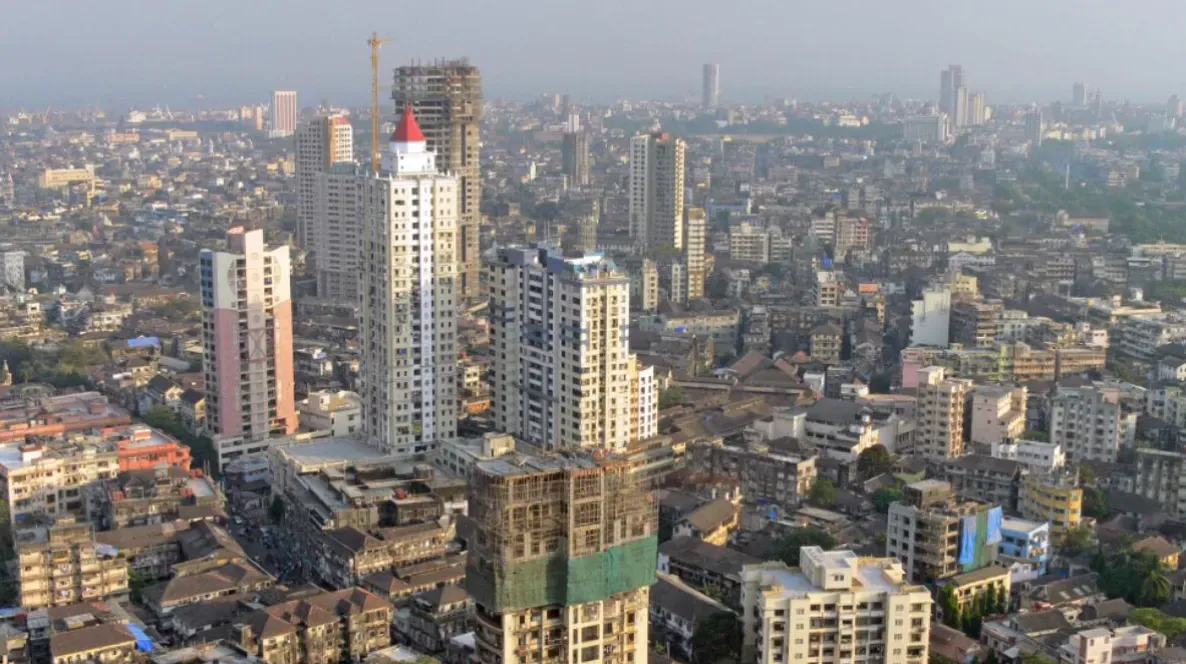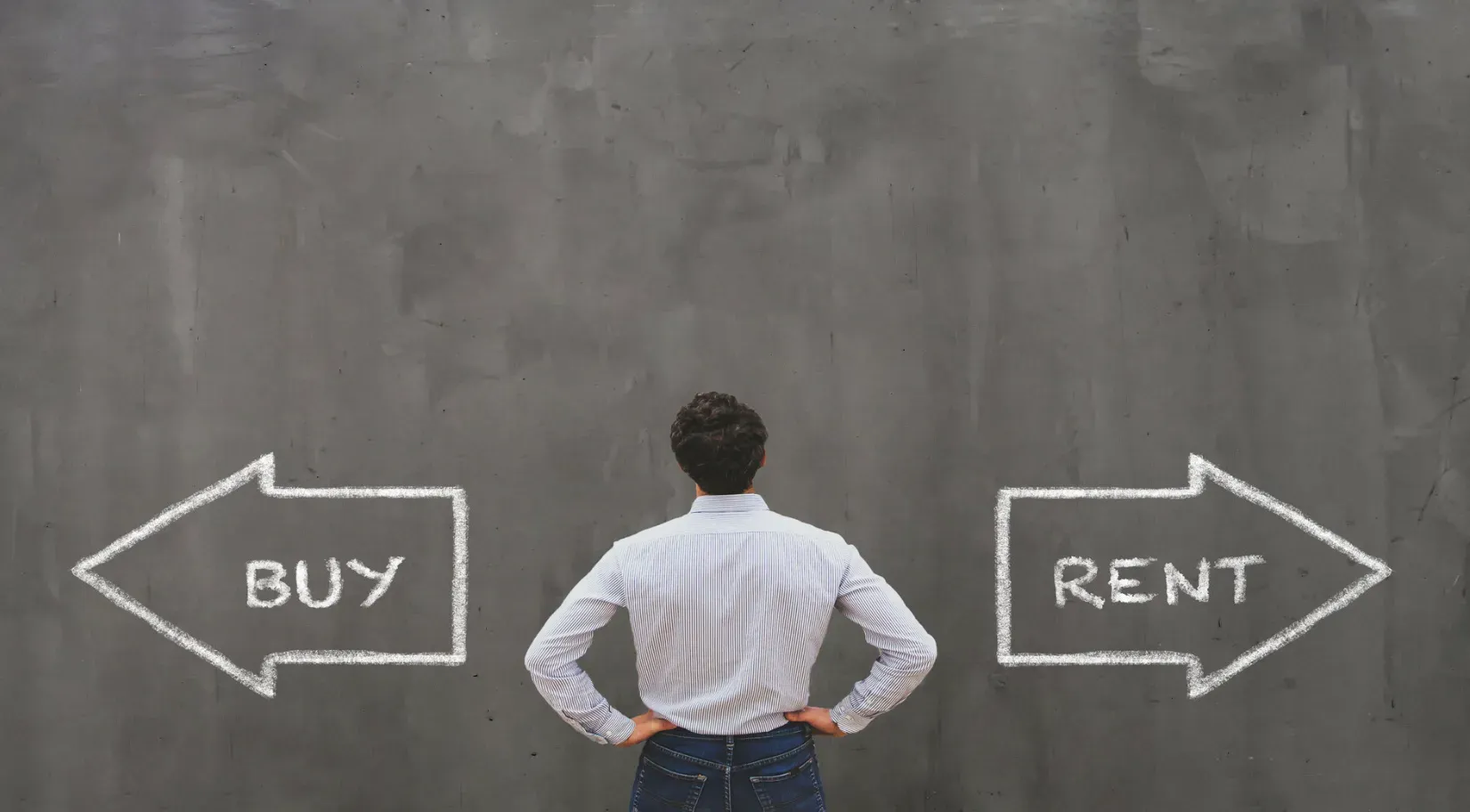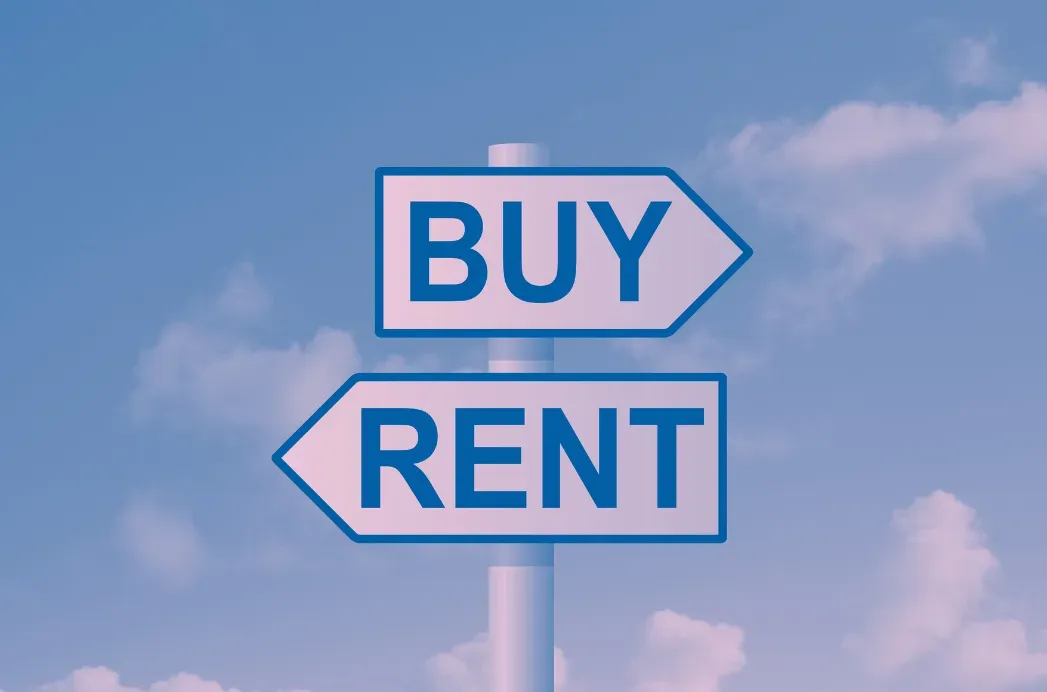Rent vs Buy 2BHK in Andheri, Goregaon, Powai: What Makes Sense in 2025?

By
Shrusti Naik
Posted on October 13, 2025. 10 mins

Introduction

For many Mumbai residents, especially in suburbs like Andheri, Goregaon and Powai, the decision between renting or buying a 2BHK is a pivotal financial and lifestyle choice. Each option has tradeoffs based on cost, flexibility, appreciation potential, and personal circumstances.
In 2025, with property prices continuing to climb and interest rates under watch, the rent vs buy debate has become more nuanced. This article walks you through the economics, risks, and decision framework, tailored for Mumbai suburbs and helps you decide what makes sense for you.
1. Snapshot: Prices & Rents in Andheri, Goregaon & Powai (2025)
1.1 Sale / Purchase Rates
- In Andheri West, a 2BHK ready flat (945 sq ft) was listed for ₹1.60 crore recently.
- Listings in Andheri show 2BHKs in the ₹1.82–2.12 crore range, or even up to ₹2.71 crore in premium projects.
- In Goregaon East, 2BHKs are being sold for ~₹2 crore in ready condition.
- In Powai (Tirandaz area), 2BHK flats are listed for ₹2.0 crore (1,018 sq ft) to as high as ~₹3.9 crore for premium projects.
- Also in Powai / IIT area, some 2BHKs are selling at ₹1.4 crore for ~705 sq ft.
These figures show: even in suburbs, 2BHKs command high capital sums, especially closer to transit corridors and amenities. Also read, 2BHK in Mumbai: Best Localities for Price & Lifestyle 2025
1.2 Rental Levels
- In Goregaon West, 2BHK rents range from ~₹ 65,000 to ~₹ 90,000+ depending on project, area, and furnishing.
- In Powai, 2BHKs are listed for rent ~₹ 62,000 to ₹ 1.2 lakh per month depending on size and project.
- In Goregaon East, a 2BHK flat in Jay Prakash Nagar was listed at ₹ 65,000 rent.
- In Andheri, listings suggest affordable ranges depending on builder and locality.
These rents represent a significant recurring cost, equivalent to a large chunk of take-home pay for many. You might as well be interested in
2. Cost Comparison: Rent vs Buy (with Illustrative Numbers)
Below is a simplified comparison of renting vs buying for a hypothetical 2BHK in these suburbs.
| Cost Component | Buying (Assuming ₹2.0 crore property, 80 % loan, 9 % interest, 20 years) | Renting (Assuming ₹65,000/month rent) |
|---|---|---|
| Down Payment (20%) | ₹40,00,000 | — |
| EMI / Monthly Loan | ~₹1,53,000 | — |
| Property Tax & Maintenance | ~₹5,000–10,000 monthly equivalent | Tenant pays or included in rent |
| Opportunity Cost of Down Payment | If invested elsewhere (say 6 % return) | Not applicable |
| Rent | — | ₹65,000 monthly |
| Flexibility / Mobility | Low | High |
Approx monthly effective cost (Buy route)
- EMI: ₹1,53,000
- Maintenance + tax equivalent: say ₹7,000 → Total ~₹1,60,000
Rent route: ₹65,000 monthly
So, in this scenario, buying costs ~2.5× renting in cash outflow, though with long-term capital appreciation potential.
Note: This is a simplistic model. Real numbers will vary based on location, loan terms, taxation, and resale value. Also check out, The Ins and Outs of Property Management for Landlords: Maximizing Your Rental Income
3. Key Factors That Tilt the Balance
3.1 Duration of Stay
If you plan to stay long (8–15 years), buying starts making sense as you unlock capital appreciation. If your horizon is short (2–5 years), renting reduces risk and avoids transaction costs.
3.2 Appreciation & Capital Gains
Suburbs near transit, like Andheri (metro, railway), Powai (business corridors), or Goregaon (connectivity) have stronger upside. If your 2BHK appreciates at 5–7% annually, it helps offset high cost burden.
3.3 Liquidity & Flexibility
Renting gives you agility, if your job shifts, or life changes, you can relocate easily. Buying locks capital and has transaction friction, selling, brokerage, stamp duty.
3.4 Interest Costs & Loan Conditions
Loan interest is a real cost. If rates rise over time, your effective EMI grows. Also, some banks may have stricter terms for resale flats or suburb properties.
3.5 Hidden / Recurring Costs
As a buyer, you bear property tax, society maintenance, major repairs. Over time these add significant cost. As a renter, many such burdens rest with landlord.
3.6 Tax Benefits
Home loan interest and principal repayment have tax deductions under Indian law (Section 24, Section 80C) when the property is self-occupied or let out. This improves your net cost of owning.
Also read, What Salary to Afford a 2BHK in Mumbai in 2025
4. When It Makes Sense to Buy vs Rent
Buy if:
- You plan to live in the flat for a decade or more
- You have sufficient down payment + emergency cushion
- The location has high growth potential / infrastructure projects
- You want to build home equity and enjoy tax benefits
Rent if:
- You expect job / location changes in few years
- Your capital can earn higher returns elsewhere (vs locked in real estate)
- The upfront cost / EMI stress is too high
- You want to avoid maintenance, repair, or tenancy hassles
5. Suburb-specific Insights: Andheri, Goregaon, Powai
Andheri
- Very well-connected via Western line, local buses, planned metro corridors.
- 2BHK resale listings in Andheri West range ~₹1.8–2.12 crore.
- Given high price base, buying is steep, renting may be more prudent unless long-term commitment.
Goregaon
- Suburb with good infrastructure and comparatively lower price than Andheri.
- 2BHKs in Goregaon East list near ₹2 crore for sale.
- Rents in Goregaon West cross ₹75,000 for better projects.
- Here, renting allows you access to this suburb without hefty capital outlay; but buying can pay off over long term.
Also read, Upcoming Mumbai Metro Corridors and Their Impact on 2BHK Property Values
Powai
- Powai commands premium due to lakeside location, business parks, and demand.
- 2BHK listings in Powai are ₹2 crore and beyond for good units.
- Rents are in the ₹60,000–1,20,000 range.
- Buying here is high entry cost; renting may be more viable unless you have considerable means or see strong upside.
Key Stats Box
Mumbai 2BHK Property & Rent (2025) – Selected Data • 2BHK in Andheri West: ₹1.60 crore for 945 sq ft resale listing. • 2BHK in Andheri suburbs: Listings ~₹1.82–2.12 crore. • Goregaon East 2BHK sale in ready condition: ~₹2 crore. • Powai 2BHK resale: ₹2.0 crore (1,018 sq ft) to ₹3.9 crore for premium. • 2BHK rent in Goregaon West: ₹65,000–90,000+. • 2BHK rent in Powai: ₹62,000–1,20,000.
Conclusion

In suburbs like Andheri, Goregaon, Powai, there is no one-size-fits-all answer. If you have capital, job stability, and a long horizon, buying can make sense and build equity. But for many, especially those uncertain about future location or with capital constraints, renting offers flexibility and lower risk.
As a rule: when your cost of ownership (EMIs + upkeep) significantly exceeds rent without factoring appreciation, renting tends to be safer. But when your property is in a high-growth corridor with solid infrastructure and you're committed long-term, owning may pay off.
For those in pursuit of their dream home, investment opportunities, or a sanctuary to call their own, Jugyah provides top housing solutions with its intelligent technology.
6. Frequently Asked Questions
-
If I rent for 5 years and then buy, is it wise? It can be, especially if property prices climb faster than your rent savings. But you miss out on home equity and tax benefits during those years.
-
How long should I stay in one place to make buying worthwhile? Typically 8–10 years is a reasonable horizon after which cumulative appreciation + equity can outweigh renting costs.
-
Do maintenance and repair costs make owning much more expensive? Yes, over time, repairs, taxes, society charges, and wear & tear can add 1–2% (or more) of property value annually.
-
Can I invest the down payment instead and rent instead? Yes, if your investments yield higher net returns than expected appreciation minus interest/expenses, renting may be better. It depends on your capacity, risk tolerance, and market.
-
Will interest rates change the decision? Absolutely. If interest rates rise, your EMI goes up, making buying more expensive. So your decision should be flexible to rate changes.